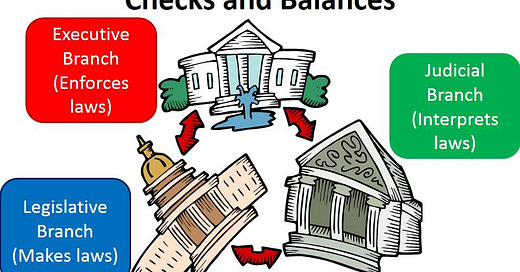Thomas Jefferson explains in the Declaration of Independence that government must be exercised with the consent of the governed. In other words, it is a social contract between the people governed and the people who govern. The purpose of good government, of course, is to secure the natural rights given to us by God. Historically, the Founders knew that there existed tensions between the consent and the preservation of natural rights.
Athenian democracy and the Roman Republic were examples of governments where the people had forms of representation in the government but their individual liberties went unprotected. To improve upon these historic governments, the constitution instituted separation of powers, checks and balances, an independent judiciary, and two distinct bodies of representation in Congress (one for the states and one for the people). This structure would ensure consent of the governed while also protecting individual rights, especially those of the minority.
As Madison explains in Federalist 10, societies consist of factions. He defines factions as groups of people motivated by a passion in opposition to the rights/interests of other members of a society. Minority factions, of course, are not a problem as the majority can outvote them. However, if the faction is in the majority, how can the minority be protected? In a pure democracy such as ancient Greece or in a republic where all of the people’s power exists in one body such as Senate of the Roman Empire, the majority faction can violate the natural, individual rights of the minority. For this reason, the Founders opposed a direct democracy consisting of small societies and created a bicameral Congress with an Electoral College choosing a president in a manner that purposefully avoided a national popular vote. Madison argues that in lieu of controlling the effects of faction via our form of constitutional government, the only alternative is to destroy liberty, which he argues is a solution worse than the problem.
By creating a representative government with limited powers, the government can filter the passions of the various factions in society and allow reason to rule. Of course, the Founders knew that only a virtuous people were capable of freedom. This point has been elucidated in my previous entries. Even so, the Founders knew that human nature was imperfect and still needed lawful structure.
As Madison states, “If Men were angels, no government would be necessary. If angels were to govern men, neither external nor internal controls on government would be necessary. In framing a government which is to be administered by men over men, the great difficulty lies in this: you must first enable the government to control the governed; and the next place, oblige it to control itself.” Ultimately, the power to control the government should rest with the people. Any reasonable person would surmise that the Founders would look at modern America and realize this no longer holds true.



